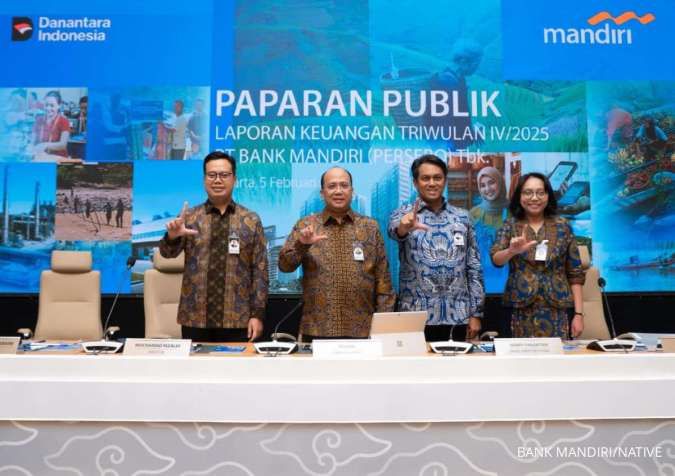JAKARTA. Citibank Indonesia has reassured its banking stakeholders in Indonesia that the company remains committed to expanding its business in Indonesia despite a major consolidation measure recently unveiled by its US parent company, Citigroup.“Indonesia is one of Citi’s 16 emerging priority countries and our commitment to the country is long-term,” sad Citibank Indonesia’s corporate affairs head Agung Laksamana via an email interview with the The Jakarta Post on Saturday.Despite identifying Indonesia as one of Citigroup’s top priority countries, the bank acknowledged that it is currently “evaluating its strategic priorities in Indonesia”, including strategies that could boost its optimization and effectiveness, Agung said.Citigroup’s newly appointed CEO, Michael L. Corbat, last week unveiled sweeping reform programs to create more efficiency within the company, including the plan to axe 11,000 employees at all of its branches worldwide.The plan, described by Corbat as “logical next steps in Citi’s transformation”, is expected to save at least US$900 million for Citigroup’s operations next year, and around $1.1 million a year starting 2014, the company said in a statement.Emerging economies are not exempt from the axe, as Citigroup said it planned to sell or significantly scale back consumer operations in Pakistan, Paraguay, Romania, Turkey and Uruguay. The bank also plans to shed 84 branches in Brazil (14), Hong Kong (7), Hungary (7), Korea (15) and the US (44), with the company expected to maintain 4,000 retail branches worldwide after the reductions, according to Reuters newswire.Agung, however, declined to comment on whether the lay-off measure would also affect Citigroup’s operations in Indonesia.Citigroup followed similar steps taken by banking behemoths across the world, notably Bank of America, the UK-based HSBC, and Switzerland-based bank UBS, all of which had announced plans to cut thousands of jobs in their business throughout the world in their bid to cut costs and improve banking efficiency.Large banks across the world were forced to conduct sweeping reforms since the 2008 financial crisis, especially as financial markets in the developed world remain languid and are yet to return to their pre-crisis state. Citigroup was one of the banks battered by the crisis, with the US government granting the bank a $45 billion bailout package following the financial fallout four years ago.Bank Indonesia (BI), the nation’s central bank, on Nov. 23 unveiled a new regulation package, including the Capital Equivalent Maintained Assets (CEMA), as preemptive measures so that Indonesians stashing their money in foreign banks would not fall the victim if a banking crisis happens abroad. Under the new regulation, foreign banks operating in Indonesia under a branch status, including Citibank, must place at least 8 percent of their third-party funds in the country in the form of debt papers, either in corporate or government bonds, with a minimum amount placed of at least Rp 1 trillion ($103.95 million).The central bank said that the regulation was imposed to protect Indonesian depositors from a potential liquidity shortage, with the CEMA acting as a capital buffer, safeguarding them from a contagious effect if the overseas parent of a foreign bank bumped into a financial crisis.Representatives from foreign banks claimed that they were undeterred by BI’s new policy, saying that the regulation will not change their business plans to expand in Indonesia, whose banking industry is seen as one of the world’s most profitable.“Citi will comply to the rules and regulations stipulated in the CEMA,” Citibank Indonesia’s Agung said.Despite operating under a branch status only, Citibank Indonesia was formerly one of the nation’s top banks, as it stood as the only foreign lender in BI’s list of top 10 biggest banks by assets in 2007 and 2008. (The Jakarta Post)
RI priority despite global job cut: Citibank
JAKARTA. Citibank Indonesia has reassured its banking stakeholders in Indonesia that the company remains committed to expanding its business in Indonesia despite a major consolidation measure recently unveiled by its US parent company, Citigroup.“Indonesia is one of Citi’s 16 emerging priority countries and our commitment to the country is long-term,” sad Citibank Indonesia’s corporate affairs head Agung Laksamana via an email interview with the The Jakarta Post on Saturday.Despite identifying Indonesia as one of Citigroup’s top priority countries, the bank acknowledged that it is currently “evaluating its strategic priorities in Indonesia”, including strategies that could boost its optimization and effectiveness, Agung said.Citigroup’s newly appointed CEO, Michael L. Corbat, last week unveiled sweeping reform programs to create more efficiency within the company, including the plan to axe 11,000 employees at all of its branches worldwide.The plan, described by Corbat as “logical next steps in Citi’s transformation”, is expected to save at least US$900 million for Citigroup’s operations next year, and around $1.1 million a year starting 2014, the company said in a statement.Emerging economies are not exempt from the axe, as Citigroup said it planned to sell or significantly scale back consumer operations in Pakistan, Paraguay, Romania, Turkey and Uruguay. The bank also plans to shed 84 branches in Brazil (14), Hong Kong (7), Hungary (7), Korea (15) and the US (44), with the company expected to maintain 4,000 retail branches worldwide after the reductions, according to Reuters newswire.Agung, however, declined to comment on whether the lay-off measure would also affect Citigroup’s operations in Indonesia.Citigroup followed similar steps taken by banking behemoths across the world, notably Bank of America, the UK-based HSBC, and Switzerland-based bank UBS, all of which had announced plans to cut thousands of jobs in their business throughout the world in their bid to cut costs and improve banking efficiency.Large banks across the world were forced to conduct sweeping reforms since the 2008 financial crisis, especially as financial markets in the developed world remain languid and are yet to return to their pre-crisis state. Citigroup was one of the banks battered by the crisis, with the US government granting the bank a $45 billion bailout package following the financial fallout four years ago.Bank Indonesia (BI), the nation’s central bank, on Nov. 23 unveiled a new regulation package, including the Capital Equivalent Maintained Assets (CEMA), as preemptive measures so that Indonesians stashing their money in foreign banks would not fall the victim if a banking crisis happens abroad. Under the new regulation, foreign banks operating in Indonesia under a branch status, including Citibank, must place at least 8 percent of their third-party funds in the country in the form of debt papers, either in corporate or government bonds, with a minimum amount placed of at least Rp 1 trillion ($103.95 million).The central bank said that the regulation was imposed to protect Indonesian depositors from a potential liquidity shortage, with the CEMA acting as a capital buffer, safeguarding them from a contagious effect if the overseas parent of a foreign bank bumped into a financial crisis.Representatives from foreign banks claimed that they were undeterred by BI’s new policy, saying that the regulation will not change their business plans to expand in Indonesia, whose banking industry is seen as one of the world’s most profitable.“Citi will comply to the rules and regulations stipulated in the CEMA,” Citibank Indonesia’s Agung said.Despite operating under a branch status only, Citibank Indonesia was formerly one of the nation’s top banks, as it stood as the only foreign lender in BI’s list of top 10 biggest banks by assets in 2007 and 2008. (The Jakarta Post)

